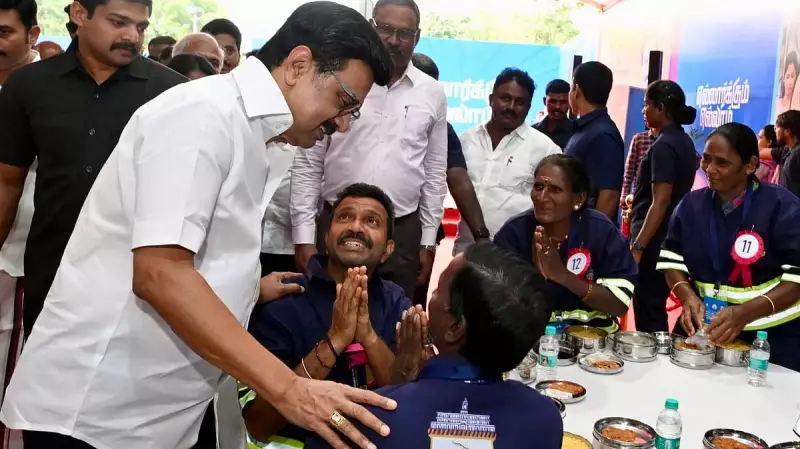
In a significant move to support municipal workers, Tamil Nadu Chief Minister M K Stalin has launched a groundbreaking free meal scheme specifically designed for sanitary workers across Chennai. The initiative aims to provide nutritious daily meals to thousands of conservancy workers who play a crucial role in maintaining the city's cleanliness.
Comprehensive Support For Chennai's Cleanliness Heroes
The newly launched scheme will benefit approximately 11,000 sanitary workers employed by the Greater Chennai Corporation. These workers, who form the backbone of the city's waste management system, will now receive free, wholesome meals during their work shifts. The program represents a substantial commitment to improving the working conditions and welfare of those responsible for keeping Chennai clean and hygienic.
Chief Minister Stalin officially inaugurated the scheme during a special ceremony held at the Ripon Building, the historic headquarters of the Chennai Corporation. The event was attended by numerous dignitaries, corporation officials, and representatives of the sanitary workers' community, marking an important milestone in the state's labor welfare initiatives.
Operational Details And Implementation Strategy
The free meal program will operate through 15 designated Amma Unavagams (mother's canteens) strategically located across Chennai. These established food centers will serve as distribution points, ensuring that sanitary workers can easily access meals during their work hours without disrupting their cleaning schedules.
Each meal provided under the scheme is designed to be nutritious and balanced, offering adequate energy and essential nutrients to help workers sustain their physically demanding jobs. The menu includes rice, sambar, vegetable curry, and other traditional South Indian dishes that provide both taste and nutritional value.
The implementation will be managed directly by the Greater Chennai Corporation, with close monitoring to ensure food quality and hygiene standards are maintained. Corporation officials have been directed to regularly inspect the meal preparation and distribution process to guarantee that workers receive fresh, high-quality food daily.
Broader Context Of Worker Welfare Initiatives
This new meal scheme builds upon existing welfare measures for sanitary workers in Tamil Nadu. The state government has been progressively enhancing support systems for municipal workers, recognizing their essential contribution to urban infrastructure and public health.
Sanitary workers in Chennai perform some of the most challenging tasks in urban maintenance, including street sweeping, garbage collection, drain cleaning, and public toilet maintenance. Their work exposes them to various health risks and physically strenuous conditions, making nutritional support particularly important.
The free meal initiative complements other worker benefits such as protective equipment, health insurance coverage, and access to medical facilities. By addressing basic needs like food security, the government aims to boost worker morale and improve overall job satisfaction among the conservancy workforce.
This program also aligns with the Dravidian model of governance emphasized by the current administration, which focuses on social justice, equality, and welfare measures for marginalized and essential worker communities.
Expected Impact And Future Prospects
The free meal scheme is expected to have multiple positive impacts beyond immediate nutritional benefits. By ensuring that workers receive proper meals during their shifts, the program aims to enhance productivity and reduce health issues related to inadequate nutrition. Well-fed workers are likely to perform better and maintain higher energy levels throughout their demanding workdays.
Economically, the scheme provides substantial relief to sanitary workers and their families by reducing their daily food expenses. For many workers living on modest salaries, this initiative represents meaningful financial support that can be redirected toward other essential needs like education, healthcare, and housing.
The program also serves as recognition of the vital role sanitary workers play in urban management and public health protection. By investing in their welfare, the government acknowledges their contribution to creating a cleaner, healthier Chennai for all residents.
If successful, this initiative could serve as a model for similar programs in other cities across Tamil Nadu and potentially other states. The structured approach using existing Amma Unavagam infrastructure demonstrates a practical, scalable solution for addressing worker welfare needs.
As the scheme rolls out across Chennai, monitoring mechanisms will track its effectiveness and identify areas for improvement. The government has expressed commitment to refining the program based on feedback from workers and implementation experience to ensure it delivers maximum benefit to the intended recipients.






